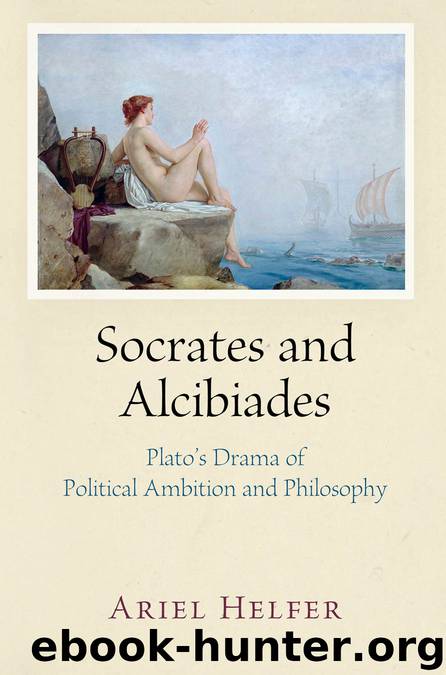Socrates and Alcibiades by Helfer Ariel;

Author:Helfer, Ariel;
Language: eng
Format: epub
Publisher: University of Pennsylvania Press, Inc.
Published: 2017-05-15T16:00:00+00:00
Morality, Piety, and Philosophy (143b–144c)
Socrates’ failure to get Alcibiades to examine the goodness of the political life, or to see the need to do so, does not necessarily mean that Alcibiades cannot be discouraged from the pursuit of tyranny. After all, Alcibiades is still in need of help, lacking as he does a solution to his apparent loss of conviction that courage and nobility are enough to ensure his happiness. Seeking the gods’ help to remedy his deficiency is no foolproof solution. The very idea seems to have been provoked by, and then strengthened in turn, a moral and psychological backlash against all that is implied by his disenchantment with the Athenian demos. That is, serious openness to the pursuit of tyrannical power, however well justified, has provoked in Alcibiades some moral and pious concerns, and the attempt to allay those concerns by seeking divine support cannot be free of the worry that the danger will thereby only be exacerbated.25 Thus, at a moment when tyranny has become thinkable for him, but courage imprudent and the character of the divine uncertain, Alcibiades is potentially open to a Socratic deus ex machina purporting to be able to resolve his dilemma. As has already been suggested, some offer of an education in political prudence might appear especially valuable to Alcibiades at this moment, and nothing prevents Socrates’ arguing that such prudence is deeply at odds with tyrannical rule, if not, as he has attempted to suggest in the past, with political life as such (Alcibiades 134b3–6).
But we noted in the Alcibiades that Socrates has something more at stake in getting Alcibiades to take up a rigorous philosophic self-examination. To have Alcibiades as a philosophic companion would be for Socrates an opportunity to test his wisdom by attempting to teach it. As we have seen in this dialogue, the wisdom in question may pertain most importantly to the question of how one ought to live, especially as that question is shaped by the character of the relationship between the human and the divine. We also took from the Alcibiades the suggestion that even if Socrates could not make Alcibiades wise, Socrates might still learn something by studying the development of Alcibiades’ thinking as he is exposed to Socratic wisdom. In the section of the Second Alcibiades following Alcibiades’ failure to recognize Socrates’ most profound critique of his political ambition, we have an opportunity to consider the extent to which Socrates is still willing to provide Alcibiades with pointers and invitations to genuine philosophic questioning, as well as the manner in which Socrates may yet learn from Alcibiades by observing what things change and what things remain the same in Alcibiades’ disposition toward piety and justice.
Following Alcibiades’ reaction to his speech, Socrates makes an unexpected suggestion. He proposes to Alcibiades that a man26 wiser than the two of them might accuse them of “not speaking correctly in blaming ignorance so indiscriminately,” unless they would additionally specify what the ignorance is of and for which people in which condition such ignorance might in fact be something good (143b6–c3).
Download
This site does not store any files on its server. We only index and link to content provided by other sites. Please contact the content providers to delete copyright contents if any and email us, we'll remove relevant links or contents immediately.
The Secret History by Donna Tartt(18082)
The Social Justice Warrior Handbook by Lisa De Pasquale(11941)
Thirteen Reasons Why by Jay Asher(8414)
This Is How You Lose Her by Junot Diaz(6409)
Weapons of Math Destruction by Cathy O'Neil(5798)
Zero to One by Peter Thiel(5459)
Beartown by Fredrik Backman(5304)
The Myth of the Strong Leader by Archie Brown(5215)
The Fire Next Time by James Baldwin(4998)
How Democracies Die by Steven Levitsky & Daniel Ziblatt(4940)
Promise Me, Dad by Joe Biden(4898)
Stone's Rules by Roger Stone(4831)
100 Deadly Skills by Clint Emerson(4660)
Rise and Kill First by Ronen Bergman(4535)
A Higher Loyalty: Truth, Lies, and Leadership by James Comey(4532)
The David Icke Guide to the Global Conspiracy (and how to end it) by David Icke(4359)
Secrecy World by Jake Bernstein(4354)
The Farm by Tom Rob Smith(4303)
The Doomsday Machine by Daniel Ellsberg(4230)
